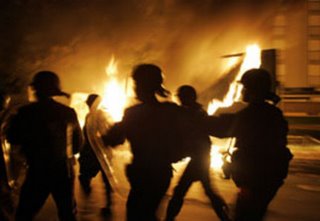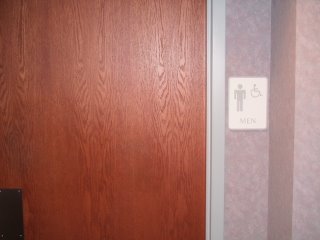For more program information, visit http://www.wcsu.edu/writing/mfa.
Friday, September 22, 2006
Teaching of Screenwriting Internship
Teaching of Screenwriting Internship
In early May of this year, I became aware of an internship possibility in the Department of English at the University of South Florida in Tampa to act as an intern in a graduate course in screenwriting (15 graduate students) taught by Professor Mark Leib. Professor Leib is a well-known screenwriter, film, and play reviewer in the Tampa Bay Area and nationally.
I met and spoke over the phone with Professor Leib several times and together we devised a proposal of what the internship would entail and require. During these discussions, I told him repeatedly that this would be my first teaching experience and that I didn’t know quite what to expect or what expectations he had for a first-time teaching intern in his class. He was positively receptive to my inexperience in teaching and said that he wanted me to learn as much as I could about the teaching of screenwriting as I possibly could from his example and from the duties I would perform during the session. In regards to my role in the course, based on my own proposal, we agreed that I would provide presentations on the untraditional screenplay that does not follow the traditional structure as defined by Vogler, McKee, Field, Trottier, and others. In addition, I would do presentations on screenplays that are adaptations of novels and short stories. For his part, he wanted me to offer critiques of the student scripts as presented in class and generally to provide insights and commentary on the topics discussed and the student scripts presented.
I was at once excited and nervous about the internship arrangement. I looked forward to the opportunity to be able to share my knowledge about unconventional film with the students in the class. I thought that my role as an assistant teacher would be beneficial in that the experience would build my confidence in speaking about writing in front of a group of other writers. The act of teaching would also make me more secure in my own insights about the subject. I also hoped that I would learn certain techniques in the teaching of writing from Professor Leib that I could carry with me for any future opportunities in the field. I was nervous about how I would perform in the role of intern because of my youth, my size, my inexperience, and my extreme shyness of speaking in front of people. The prospect was even more intimidating because of the status of Professor Leib in the film community. I wondered whether my insights about film would compliment the wisdom he would no doubt bring to the class table.
I began the teaching internship with Professor Leib on July 3, 2006, summer session B, and completed it on August 11, 2006. This experience was especially important for me to do during the summer since it would be the only time during the academic year that the University of South Florida Department of English would offer a course on screenwriting in which I could act as an intern.
For this internship I maintained a detailed daily log of each class session that chronicled my tasks, activities, insights, research, and networking connections especially with my own writing. I prepared detailed presentations on Charlie Kaufman's Adaptation, Paul Haggis's Crash, M. Night Shaymalan's The Village, and Joe Wright's Pride and Prejudice. I also briefly discussed a number of other films including Love Actually, Traffic, Syriana, Playing By Heart, Gosford Park, A Prairie Home Companion, Memento, among others. It has been especially gratifying for me since the completion of this internship that several of the students have contacted me about additional critiquing of their scripts.
I welcome the opportunity to reflect back on this experience. I will provide even more details as to what I accomplished in this internship and how it has prepared me for the teaching of screenwriting. I look forward to sharing my insights and anecdotes about this experience.
Thursday, September 21, 2006
My NBC Agency Internship

I toyed with the idea of calling this “My Accidental Internship”, but that would not be giving me enough credit for actually getting in the Fort Knox of Corporate Entertainment. Therefore, I am sticking with the current title and hoping that a screenwriter here remembered how to write essays. Also worth mentioning is that my first day of work is September 18th, so some of the details are still a little unclear, but as the semester moves forward I will be more than glad, and required, to update on the progression of the internship.
The internship will be for the National Broadcasting Company, hereby called by its more informal name of NBC. The building is at 30 Rock, on the 18th Floor East. The department is The NBC Agency and my supervisor is David Lipsius who is the Sr. Director of Operations. I will be a lowly intern working Monday through Friday working exclusively for the editors with the News Department. I am one of two student interns hired.
This is a brand new arrangement that was sparked by a pre-existing relationship. My father got me in the door to sit and discuss work opportunities with a business colleague of his. After I was told that there was pretty much nothing and that I live on the wrong coast, I was sent on my way, but then as luck would have it there was someone that I just had to meet. I sat an hour in my current supervisor’s office waiting out an emergency meeting and when he came back little did I know, I was on a job interview. A little flustered, I tried my best, he sent me on my way with an assignment due in one week, and if he liked it, he’d hire me. A week later, I nailed it, and I got it. Basically, I got upstairs with help, and the job on my own. Hence, my first title of “My Accidental Internship.”
As I previously said, the tasks were pretty vague. All I know is that I will be working with the editors as an intern, the details will be better in a little over a week. I think that the information I know about the field is small. The field is advertising and marketing in the confines of the News Department. I have no prior experience and really no academic training other than basic knowledge and information that I have siphoned off of my father. I want to learn everything about everything. Seriously, I would love to learn the business and be able to be a functioning member of the office so much that I would need no instruction. Having zero business and corporate experience, if I could do my tasks with a minimal amount of supervision and headache for my boss, that is my goal. In order to do my job, I need to learn marketing, editing(not the physical task, but the why, what, when questions), and even office etiquette.
Experience experience experience. And did I mention experience? I first went into NBC looking for an entry-level position for a job, I came out with a Fall Internship. During the job seeking process I learned many things and most of those were that my resume was poor and I have no experience in the field or in the corporate world. Therefore, the most important aspect of this job is being able to put it on my resume so that I can get an honest look at some other positions that before I would never have been able to reach. My undergraduate program at URI just might be the only school I’ve ever heard of that has no internship program, and is actually discouraged. There is a few majors that will offer course credit, but those majors are more in the education or engineering fields. Now that I am fresh out of school and looking for jobs, everyone seems to want experience which I can not offer. It is a vicious cycle. I can not get experience without experience. When they said that they only do credit internships, the timing of our third semester could not have been more perfect. Some of the other benefits I mentioned earlier. Office and corporate etiquette, knowledge about network television and more specifically the business end of it. All the things that a text book or a professor unfortunately can not teach. Then, hopefully I can walk out ready to take my resume to other places and conquer the world.
My field is screenwriting for both television and film so while I will not be doing any creative writing and more specifically screenwriting for this internship, I will be working for one of the major television networks in this country. This internship will make be a better and more refined worker and I really look forward to the experience.
Teaching Writing

As I think back on my school years, it is clear that the best teacher I had was Mr. Hahn. He was gentle and kind, he was patient, and he was not afraid to admit his shortcomings. But what I loved most about him was his willingness to improve his teaching. He varied his teaching methods often, and he frequently asked us students for input. I have tried to model my teaching style after his.
To that end, after each semester, I ask my students to reflect on the past weeks and write me a brief note about what they have learned from the course, what they enjoyed about my class, and what I could do to improve it for the next time. I have been intrigued to note that the students in my American Literature class often say they would like to do more creative writing assignments. Since it is an English class, their writing is heavily weighted toward the formal essay, and I am pretty sure they were hoping I would replace a few of those essays with fiction assignments instead. Unfortunately, the department handbook demands a certain number of formal essays, and I do not have the luxury of throwing those assignments out the window. But I can replace other smaller assignments with “creative writing” assignments.
So that will be the focus of my practicum this semester. In my fourth year at Napoleon High School, I feel like I have become familiar with my classes enough to have the leisure to create and add different assignments. In the past, I have retained quite a bit of consistency from one trimester to the next, with my lessons and units changing very little. But this year will be the year for more change.
In American Literature, I have already arranged thematic units, which include a variety of topics, such as “Identity: Who am I?” “What Is an American?” “Is America a Land of Equality?” “An American’s Beliefs,” and “What Makes a Good Short Story.”
I intend to keep the same units and integrate brief lessons on creative writing techniques and creative writing assignments into the lessons I already teach.
In the past, I have assigned brief written responses to the literature we’ve read perhaps two times each week. These written responses usually vary greatly in creativity and originality. I have often been frustrated when reading them by many of my students’ carelessness in their writing. They don’t have any deep interest in the brief responses, they don’t feel like they really “count” as far as a grade is concerned (homework is only weighted 20%, whereas essays are 40% of their grade in the class), and it is clear that they have written the responses as quickly as possible just to get them done.
I want to change that this year. I want them to care about what they are writing, to take their time writing, to even be excited about it. So the challenge for me will be to design assignments that allow them enough freedom of choice while still setting expectations for the assignment. These are the changes I will make to my teaching this year, then: first, I will look over my existing units for ways to incorporate creative writing assignments; second, I will create choices for each assignment so that students are more invested in what they write; and third, I will assess their progress at the end of the trimester through the use of writing journals and student self-assessments in which they analyze and reflect on their writing progress.
A note about the writing journals: I have had students keep a writing portfolio in the past. All their essays would go into this portfolio, and they would write a very brief assessment on their strengths and weaknesses for each essay after receiving the graded essay. This year I intend to do something more formal. I think I will have each student keep a spiral notebook for writing assignments. They will turn this notebook in each week, and the notebook must include their creative writing assignments and a brief journal entry about their writing that week. The journal can include comments on writing process, generation of ideas, problems with grammar or mechanics, really anything about their writing. Hopefully this will encourage the students to be more deliberate with their writing choices, to think more carefully about how they write and why they write.
As the semester progresses, I will be looking for books and articles on the teaching of creative writing, specific ideas for assignments, methods of assessing students’ creative writing, and any research on the benefits of using creative writing in a traditional English class. I am sure I will find much more material than is required for this class.
In short, this semester’s teaching practicum should be an enriching experience for my students and me. I am hoping that I can excite them about writing, to make it a challenge instead of a chore, to show them that an English class is not entirely about essay writing and busywork writing. I hope to become a better teacher of writing, one who is more thoughtful about the goals and outcomes of every writing assignment and its benefit for the students.
Wednesday, September 20, 2006
Son of Sam on my Block
So, you remember my stories about the guy who spends the summer tormented by his lawn mowing neighbor, who has a snake problem, and a wife who wishes he would do something more than obsessing about the neighborhood. Well, I am currently working on the newest short story.
In my neighborhood, they're filming a movie called The Bronx is Burning which takes place in 1976 when the Son of Sam murders were happening and when the Yankees were playing ball during the blackout.
I have trailers lining the streets, all night shoot one street over, complete with gun shots, and door-to-door searches. We have riot victims strolling around eating at the food tent, John Turturro signing autographs, and really who could make this shit up.
New London has become a filming mecca because of handsome tax breaks on filming in Southeaster Connecticut. Also coming is a huge movie studio in Norwich called (ironically) Utopia Studios. It will be movie studios, rides, tours, and some other shit to draw people in.
As an interesting side note, they had to bring in people to scum up our already scummy city, spraying graffiti and trash about to get a New York feel. Turns out my neighborhood looks just like the Bronx in 1970 - great. They are going door to door on the next street looking for the Son of Sam, yelling with a bull horn, rioting and shooting guns and then it all stops while they reset the scene. I live on the edge of the city and beyond the end of my street is woods that tracks off for five or six miles into the suburbs called Waterford. So, in between movie noise I can hear a pack of coyotes howling to the sound of distant fire truck sirens - and I think I am really dreaming. It might go something like this: I had this dream that John Turturro, ya know the guy from Brother Where Art Thou was walking around the neighborhood filming a movie about the Son of Sam but they were worried because of the coyotes in the woods. And there were these people all mangled from the riot, but they weren't hurt - they were eating sandwiches and smoking.
By the way - if anyone has heard stories about how weird my town is - it's not so far fetched that The Son of Sam is on the next street shooting a shot gun into a windshield. The generators are on again and the trucks are moving the scene around. It will go on all night.
Don Stitt might make some kind of reference about how I am ready for my close up, but this is close enough for me. -- RS
My Internship at Firewheel
 My fall internship takes place at WestConn (the mid-town campus) one day a week under the supervision of our very own Brian Clements. All of the work that I am doing there is concerned with Brian’s non-profit publishing house, Firewheel Editions where Brian serves as editor (and founder.)
My fall internship takes place at WestConn (the mid-town campus) one day a week under the supervision of our very own Brian Clements. All of the work that I am doing there is concerned with Brian’s non-profit publishing house, Firewheel Editions where Brian serves as editor (and founder.)For those not yet familiar with Firewheel, it’s first works, Best Texas Writing, Volumes One and Two, were published beginning in 1996 in---where else?--- Texas, by Brian and then-co-editor, Joe Ahearn. These volumes are eclectic collections of poetry, fiction, and essays, proudly all written by Texans. In addition to these, Firewheel has also published Chapbooks, books of poetry by single authors (i.e., The Book of Willie and Mille et un Sentiments), and perhaps best known, the series, Sentence: A Journal of Prose Poetics.
The internship at Firewheel is a new arrangement as of this summer and will primarily entail me bumbling through that which I know very little about: basic computer skills, prose poems, and working within the publishing world. But, as an eager novice/intern/writer, learning these skills are essential to making things happen, so I am hoping to make some major headway with the help of Brian, Laurel and Tonia, (who also helps out with Firewheel.)
Before talking about what my internship tasks are, I first need to address the idea of Sentence, and the prose poem, as that was what I really needed to have explained to me before beginning work at the internship. For those of us who don’t already know, in the simplest of terms, a prose poem is a poem written in prose. But, according to Michel Delville, author of The American Prose Poem: “…[It] has developed almost as many trends as there are poets practicing it, so that any attempt at a single, monolithic definition of the genre would be doomed to failure.” That said, Sentence explores and displays any and all forms of this elusive kind of poetry through essays, criticism, interviews, translations---and, of course---a variety of the poems themselves.
Every day, submissions come in for the latest volume of Sentence. Either Tonia or I, or both of us, will read over these submissions and decide whether or not, first and foremost, they qualify as prose poems. If so, they are logged into the computer system along with the poets’ information, and passed on to Brian. If a poem is of particular interest, we may make note of this to Brian. There are also submissions which come in via email which need to be sifted through in a similar manner. In addition to submissions, my tasks may also include the following: looking at books whose reviews may potentially be published in Sentence, responding to questions regarding submissions, sending out letters (as an “editorial intern”) which ask for donations and/or subscribers’ signing up again for the next volume (in case they haven’t already), or for any number of things Brian may need for me to do, which may include packaging up the latest volumes of Sentence to be send out, etc. It varies from week-to-week according to what needs to be done and their order of importance.
As we know, this semester’s internship or teaching practicum is essential in laying the foundation for the more logical aspect of what an MFA in Writing could lead to, appealing to the need we all have to financially support ourselves doing something which we love, but whose reality is a difficult one. I am hoping that this semester will give me the confidence to see and believe that this is possible.
I have never formally studied poetry, which is not a surprise since we know who the few, brave poets in the class are. But, I am drawn to it, (attempting it privately on occasion,) and am in awe of the work produced in and among our class, by our mentors, and the rest of the world. So, what I hope to gain from this internship would be: a much better understanding of poetry and more specifically, the prose poem, a much more confident grasp of some essential computer skills, a comprehensive overview of what it is like to work within a small publishing house like Firewheel, and most importantly, an ability to assist in editing and proofing, leading to an ability to competently perform any tasks necessary to work within such a field.
Writing for the Student Operated Press
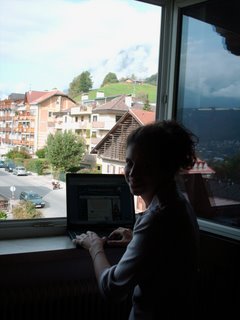
The Student Operated Press has already gone out of its way to bring me on board and publish my writing. Because all contact with editors is made over the phone, email and AIM, I'm able to telecommute from Austria (our only office runs along the lines of an ethernet cable). I love the idea of the Student Operated Press on so many levels: how it began, how it works and what it aims to do.
The SOP is an online news publication modeled after print newspapers, with sections including Business, Art & Literature, International News and Travel & Tourism. It was created by Judyth Piazza, a writer and broadcast media personality with the College Press, who initially had trouble getting her own voice and writing out there and heard. The publication aims to mentor and publish beginning writers with something to say; its long-term goal is to place 20,000 students in media-related jobs nationwide.
I’ll intern with the Press this semester in the hopes of establishing new relationships with writers, the first of which was with Judy when I applied for the position. She has already proven to me how committed she is to her students and the press—she’s offered her personal phone number and AIM address as well as the emails and AIM’s of all mentoring editors that I can contact whenever I have a question. Thanks to her efficiency, it took only one week from the time I applied until my internship began and my first article was published on the press. (http://www.thesop.org/article.php?id=2045)
Among other things, I think this internship is a great opportunity to reach many people through my writing and to learn how web publishing works. For example, the SOP receives 3,000 hits daily. And the piece that I wrote was picked up by Google news, which means that it will circulate among that many more readers. The pick up by Google raised the question: how does a website’s story get picked up by Google news or other sites? Does the SOP market the articles out, or does Google have people whose job it is to scan the internet for content? Judy should be able to answer this for me. As I’ve grown interested in website creation and publication, the online aspect of this internship may be beneficial to me in the future in addition to the writing end.
The internship also provides an opportunity for me to build that platform which Anne has mentioned over the semesters. The SOP is posting a profile to include my biography, writing experience and email address, and all of my stories will appear under that profile. This will be a great link to include with article submissions and other writing ventures.
While I’ve chosen to contribute mainly to the travel section, I can write any type of article that I’d like for any of the 28 sections. And I have the flexibility to write those articles as features, personal experience or straight news stories. This will expand my writing experience and the types of published clips I can offer. The way that article submission works is this: I fill out an online form that includes the body of my article, a brief summary, title and any accompanying photos. Once submitted, it goes to one of the mentoring editors who contact me to discuss any changes or suggestions. The revised article gets approved and is then posted on the site by an editor.
The expectation for this internship is that I will sign on to the site daily, read through the articles and writing tips, and submit an article each week. I plan to get more involved than this, and the attitude of the SOP encourages it.
Because of the camaraderie among everyone involved and the positive intentions of the SOP, I believe it has the potential for many networking opportunities and future positions. I have already met and begun working with Judy Piazza, and she has suggested that as an SOP intern, I introduce myself to Del Marbrook, a novel writer and executive editor for a chair of four dailies in Northeast Ohio and executive editor for a merger of two dailies in northern New Jersey.
Taking full advantage of the opportunity would include talking with other contributors, resourcing the newspaper editors and book writers who contribute their time as mentors, like Marbrook, and submitting more articles and even audio feed to accompany stories (again, something I’m not sure how to do now, but that I can learn with Judy’s help).
As for my personal writing growth and goals, I see this as a great motivator. I'll be required to write and publish at least one article per week in addition to the other projects I’ve worked on, but haven’t seen go anywhere. I can branch out into writing styles that I’m less familiar with and get professional feedback. In addition, I can search for topics and write about situations that also pertain to the travel-themed fiction book I’m working on.
Much like our MFA program, I believe that this internship will give back as much as I put into it.
Tuesday, September 19, 2006

“¿Donde Puedo Conseguir Una Buena Cerveza en Cancun?”
(Or Why I Chose Interning at The Hartford versus Bartending in Sunny Cancun)
By Anne Witkavitch
(photo credit The Hartford Financial Services Group, Inc.)
Juggling, multitasking, prioritizing – there are a multitude of buzz words that are used to describe the delicate balancing act we all struggle to perform in our daily lives. But when those balls in the air are full-time employee, full-time parent, and full-time graduate student, keeping all of those spheres in motion is in itself a full-time job.
So when the word “internship” appeared among the syllabi for the fall’s sixteen credit semester, my first inclination was to drop all the balls, change my name to ‘Conchita’, take the next flight to Cancun, and begin a new life as a bartender at some swank resort. However, given the opportunity to perform the internship at my full-time job offered me an interesting personal challenge I couldn’t refuse, not even for sunny Cancun – how could I construct an opportunity that would be of value to both my graduate studies and to my employer?
The answer came when I decided to “intern” by developing and facilitating several writing workshops for communicators at The Hartford Financial Services Group, Inc., where my “real job” is Director of Employee and Executive Communications for the Property & Casualty division.
Our Corporate Relations team is focused on “raising the bar” in three key areas of corporate communications: improving channels, building the network, and enhancing content. My internship focuses on the third leg of that strategy by creating workshops that will help the company’s communication professionals hone their writing skills and develop new competencies in areas like writing for the web and storytelling, which are critical for communicating in the 21st century workplace. Our communication professionals have proactively expressed their interest for some sort of continuing education/curriculum to support skill development; some have a professional background in the communications field, others have transitioned into the role from other functional areas. This presents a huge opportunity to support these colleagues in “raising the bar” in their professional development while helping to improve the quality of product produced for internal communication needs.
When I look at my future goals involving my writing, one area that has always been of interest is to do more training/teaching as it relates to the writing craft and communications profession. While I have some background in training and have facilitated pre-designed workshops, I have not previously developed curriculum. I am looking forward to learning how the process works from start to finish, from analyzing skill development needs, to outlining several workshops and identifying the objectives, learning modules, and benefits of the program, and finally facilitating and measuring results.
I will benefit from the advisement and counsel of Jim Gould, Vice President of Executive and Employee Communications at The Hartford, who will be my sponsor for the internship. Jim holds an M.F.A. from Columbia, and is a former college professor and administrator, as well as a published author and freelance writer. I will be working with Stefanie Dion Jones, a member of our Corporate Relations team, who is spearheading the overall development of a core competency skills enhancement model for The Hartford’s communicators. I will also benefit from the mentoring of several human resource professionals I know who have backgrounds in training. I also expect to tap into the expertise of other professionals I know in the field, particularly to learn about the new technology being used for training, such as webinars and telemars. I anticipate that my reading list will include magazine articles and books that explore these new avenues for delivering training and marketing the offerings, as well as professional trade journals.
The goal of the internship is to develop and deliver several training modules that can easily be replicated and adapted to the evolving needs of The Hartford for its communicator community. As well, I am looking forward to learning about how to develop curriculum so that I may eventually create local workshops for external audiences, such as for my town’s continuing education program, a community college, or as an online offering.
Stef and I have begun the process of creating a survey to measure interest levels of the communicators on a variety of communication topics, including business writing, storytelling, grammar and usage, editing, presentation skills, and others. After analyzing the results of the survey, we’ll choose the top three or four topics of interest. I will then develop the pilot workshops, with my next steps being researching, writing, and developing the teaching modules for each. The final steps will be to schedule and deliver the workshops before the end of the year.
I am looking forward to this internship, not only for the knowledge I’ll gain from the experience but that I’ll also be able to create a valuable mechanism for helping my colleagues develop professionally.
Anyhow, given that my last mixology course was a night class taken while in college many years ago, and that my only retained knowledge of high school Spanish class is limited to the McDonald’s Big Mac jingle, it is probably a good thing that for my internship I’ll be sticking to what I know best – writing, communicating, and The Hartford. Somewhere on the beaches of Cancun, the natives are breathing a sigh of relief.
My University Relations Internship

 I will be reporting and writing for University Relations, which is a sub-division of Institutional Advancement at WestConn. University Relations (UR) is divided into Public Relations, which is the media relations and marketing communications component, and Publication and Design, which is the graphic arts, design, and publishing component. Both departments seek to advance WestConn to the public and university community through targeted and controlled use of the media.
I will be reporting and writing for University Relations, which is a sub-division of Institutional Advancement at WestConn. University Relations (UR) is divided into Public Relations, which is the media relations and marketing communications component, and Publication and Design, which is the graphic arts, design, and publishing component. Both departments seek to advance WestConn to the public and university community through targeted and controlled use of the media.Toward that end, the department promotes accomplishments of its students, faculty and staff, to the university and community at-large through press releases and announcements of university events, by publishing Communique and WestConntributers, and by providing the press with requests for news on various topics of interest to the community.
The public relations department is run by Paul Steinmetz, who spent 24 years as editor of The News-Times, the regional daily newspaper of Southwestern Connecticut.
The department works closely with Alumni Relations, and Development, which also fall under the umbrella of the department of Institutional Advancement.
This will be a new experience for me. The idea unfolded for me as I worked with Irene Sherlock, (one of our MFA faculty on a course last year) who works here in the University Publications and Design office. Through our various discussions about feature writing she suggested I look into an internship with this department. She spoke highly of Paul Steinmetz.
As a reporter and a writer for University Relations I will be interviewing and writing for various formats like press releases, radio (local and, more recently, international), feature stories for Communique and WestConntributers, and cut-lines (a term for the captions found under pictures!). I will also be responding to the press service, which solicits stories for various news publications. For example, NPR will be using an interview of a WestConn student they conducted after UR responded to an open request for an interviewee for a specific story on higher education.
In many ways this is very basic news writing; making sure you get the five W’s covered and presenting it in an inverted pyramid structure. The type of formats, however, will dictate the form used, and this is something that I do not yet know about. For example, if you Google, press release, you will find that there are many different ways to lay out the information on the page for a press release. Yet, I imagine that there will be standards for this that I will have to learn for the public relations press release, radio copy, etc.
Interviewing is an area I am not skilled at. In this environment most of the people who I will be interviewing will want to speak with me, after all, it is about positive publicity, but I wonder if there will ever be conflict between what the interviewee wants conveyed and what the UR department wants to convey. I guess that is the politic side of things, which I am interested to find out how to respond to.
I am looking for experience particularly in the area of feature writing. I feel like I still have a limited sense of how to do this kind of writing, especially when the topic may not interest me, and to make it interesting. I hope to be able to begin to have a sense of my own style as a feature writer, and I am looking to gain confidence in my non-fiction writing during this internship. I also hope to gain a better sense of the world of news, and how to create it.
I believe that the interviewing process is key, and I am intimidated by it. So I hope that I will begin to feel more in control of the process, whereas, right now I feel like it controls me. I don’t always think to ask questions beyond the obvious. Now, I know that PR is limited and somewhat circumscribed, but I guess that is where the challenge lies for me. I think that this will help me to become better aware of myself as more than just a repository for news, but a shaper of a message, which is my one of my goals as a non-fiction writer.
I have a rather skeptical view of public relations; I see it as spin, but at this level I think it is a little more benign than, say, the Bush Administration Spin. But, any spin, is spin, nonetheless, I guess (sorry.) I have always been interested in communications and media, and I think that Americans have a strange relationship with it. I like to explore some of these ideas in my poetry and in my personal politics, so if I get any further insight into the machine of public relations while doing this, it will be a bonus.
I also imagine that this kind of writing is just good for the grey matter, a way to strengthen writing muscles that I don’t ordinarily use. I have found that I am a better reader of non-fiction, having studied it a bit, and this is also a plus, both personally and creatively. I find that I use more of the interesting non-fiction that I come across, as a kind of muse for some of my work, than I used to do before.
Monday, September 18, 2006
Posting Photos
If you guys have any advice on how to successfully post photos, please post your advice. A couple others are having trouble getting their photos posted.
Thanks,
bc
Saturday, September 16, 2006
Manslave Hayes
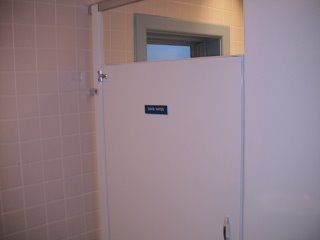 The intern's editoral desk.
The intern's editoral desk.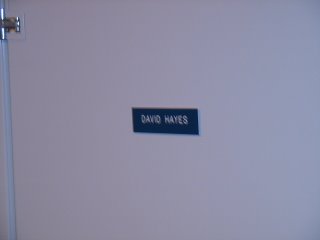



The best part about sorting the mail is that the security guard gives me a hard time by making me stand in the lobby for a long time and calling everyone he can think of to try to validate my “story” of having an internship with the CT Review. Once I pass him, I can drink all the free, Poland spring water I can handle in one sitting from a water cooler. Also, the tiny, lunch room has a vending machine that carries Reese's Peanut Butter Cup Rice Crispy Bars. I have found these rare treats in no other place.
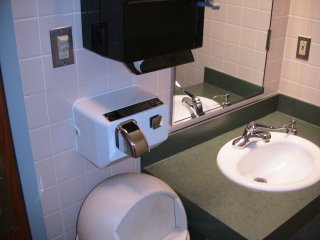
To summarize envelope stuffing has taken a few minutes of contemplation. I take letters and issues of Connecticut Review place them in an envelope and send them to directors of MFA programs. Thus the MFA administrations can tell their budding, brilliant progenies to send their work to Connecticut Review thus giving me more mail to sort. See Brian if you would like a sampling of various literary journals hot for your writing best. Make their interns pay for their foolish choice to volunteer their precious life.

My duties as research chimp have not yet begun. I hope to stay as quiet as possible about this— ninja quiet.

Now a word about filing: unfulfilling. But really it’s not that bad. There is this whole, pulp tomb of accepted manuscripts that I have to sort. I rummage through those stories and poems with the current issue of CT Review to ensure that previously published stories don’t find their way into another issue of the magazine. This requires going thorough a hundred or so manuscripts and comparing their titles to the titles in the table of contents of the current issue. Those rascally, previously published manuscripts! You never quite know where they may turn up.
At some time I’ll get to read the submissions sent to the Connecticut Review and fill out these sheets called “Manuscript Evaluation Fiction.” I will vote if a story is a yes, maybe, or no. I will compose a 100-word synopsis of the story and evaluate the plot, pacing, setting, characterization, dialogue, and point of view. On the sheet, the second to last and most revealing question of this fiction vetting is “Does the story have an edge?” If it does, in fact, have an edge then the final question is posed, “Does the story present uncomfortable or subtle forgotten truths that make you mentally catch your breath, or was it mainly dressed up platitudes?” If you are able to understand that particular sentence, please email me at david_j_hayes@sbcglobal.net. Thank you for your kindness.
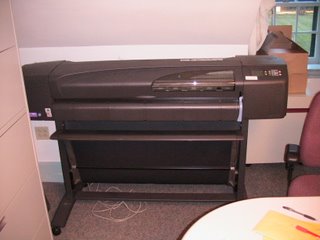 This giant printer prints early versions of the CT Review on that paper they use to cover the seats at the doctor's office. It is pretty neat.
This giant printer prints early versions of the CT Review on that paper they use to cover the seats at the doctor's office. It is pretty neat.Tuesday, September 12, 2006
Reporting in Southeastern Connecticut
When I started writing for the Inquiring News, New England’s Largest African American Newspaper, I was a little frightened by my first assignment in the spring. The editor and publisher Reggie Hales needed interviews with all the gubernatorial candidates spread over three issues. John Destefano, Dan Malloy, and finally incumbent Jodi Rell. I went back to my mentor and said, “I don’t think I am qualified for this assignment.” He shot me back an email and said, “You’re a citizen, you’re qualified.” Now, I never look at an assignment as a writer who doesn’t feel qualified. If I don’t feel qualified, it is my job to be ready, do the research, and write the best I can.
I caught Destefano in person at a press conference. And silly me, I thought I would have trouble getting a politician to say something. I had more than enough. I was also able to do a phone interview with Jodi Rell who also spent more than fifty minutes on her platform and her hopes for the coming race. Completing that series, I began to not only understand my position and my place in journalism; I also wanted to get better at it.
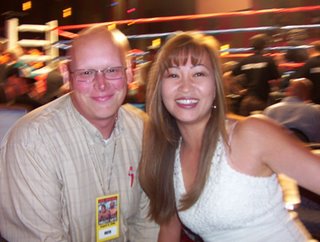
Ron ringside interviewing a fighter's wife for Inquiring News.
My mentor said once that his motto is: “Hang out with people, write simple declarative sentences, afflict the comfortable and comfort the afflicted.” And so far, I have found those words to ring very true in my experience. In my internship this semester, I will be a contributing writer for the Inquiring News. My range of work includes obituaries, covering boxing matches, the race for the governor, Katrina Anniversary, 9/11 Anniversary, and others. This semester, not only will I work on suggestions from the editor, I will also try to build up connections in the area and create news stories for the editor to pick and choose from. I would also like to write enough work to have a portfolio of clips to present with my resume.
In the process of writing this semester I would like to write more in-depth articles and perhaps get back to my investigative journalism. One project that I would like to foster is researching how the government has Private Contractors making millions and millions of dollars during war time, relief efforts, hurricane rebuilding and other place around the world. It seems private military contractors (PMC) follow turmoil around the globe and cash in. Are they corporate mercenaries, or just corporate opportunists?
Writing for a newspaper has shaped important realities for me in the past and I would like to foster them more now. There is no magical muse in newspaper writing. It’s due on this date, and that is it. If you don’t feel it, too bad – write it. I think professionally it is important to foster skills that include meeting deadlines, working in the field, and shaping my abilities to work effectively and make my editor happy.
My goal by the end of this internship is to continue to write for the Inquiring News, and begin my search for a writing job. I would like to work in journalism, public relations, or academically. Internships and working relationships are what we are here to take advantage of in this program. Not only will my writing improve, but so will my network of people who might get me into a job that will a career someday. Although the professional aspect of my studies was one semester, I was lucky to work intensely with a mentor who was willing to push me and connect me with useful contacts. This had turned into opportunity for this internship. Hopefully it will turn into a positive career opportunity. Lastly, I would like to develop some professional afflictions as a writer and journalist. I was part of the Writer’s Union; I would also like to get actively involved in the IRE (Investigative Reporters and Editors) organization and other place that can foster my skills and career, while shaping my path through this field of study. - 9/14/06

